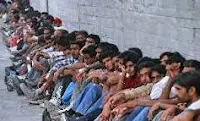The UN refugee agency (UNHCR) was concerned about restrictive practices adopted in a number of European countries over refugees and asylum-seekers, a UN spokesman said Tuesday.
The UN agency "says that it appears some European countries are focusing on keeping refugees and migrants out more than on responsibly managing the flow and working on common solutions," UN spokesman Stephane Dujarric told reporters.
On Feb. 17, Austria announced it would place a daily limit of 3,200 people to enter its territory and only accept 80 new asylum applications per day. Slovenia followed suit and announced a similar cap to restrict movements across its borders.
"The Refugee Agency stresses that a comprehensive, coordinated strategy built on shared responsibility, solidarity and trust among all European States working together is the only way to approach the current emergency," he said.
"While coordinated action can help the management of the mixed migration movement, the statement has been interpreted differently by countries, resulting in increased protection risks for refugees and asylum-seekers, particularly those with specific needs, such as unaccompanied and separated children," the UNHCR said in its statement.
The risks include lack of proper registration in line with EU and international standards, the selection of people on the basis of nationality and other criteria rather than protection needs, and the heightened likelihood of pushbacks and people being stranded in the open.
Such practices also undermine the conclusions reached by the European Council last week recalling that to enter the EU without adequate travel documentation, people need to apply for asylum when reaching an EU country, the UNHCR said.
The practices have resulted in a build-up of refugees and asylum-seekers and migrants in Greece and in the former Yugoslav Republic of Macedonia, where nearly 700 people, mostly Afghan nationals, have been barred from accessing admission into Serbia.
In order to support a joint approach and to allay fears and potential chaos, states need to inform refugees and asylum-seekers of their procedures, including clear details on the criteria for access to admission, asylum or return, in line with applicable laws, the UN agency said.
The UNHCR said that it is making good progress in providing accommodation for 20,000 asylum-seekers in Greece, and will continue to provide support to states to help manage the situation humanely and in line with international standards.
Meanwhile, the UN agency also urged the creation and expansion of credible alternative pathways for refugees to reach safety in Europe and elsewhere in order to ensure that movements are manageable and safe.
[Xinhua]
24/2/16
--
-
Related:
The UN agency "says that it appears some European countries are focusing on keeping refugees and migrants out more than on responsibly managing the flow and working on common solutions," UN spokesman Stephane Dujarric told reporters.
On Feb. 17, Austria announced it would place a daily limit of 3,200 people to enter its territory and only accept 80 new asylum applications per day. Slovenia followed suit and announced a similar cap to restrict movements across its borders.
- In addition, on Feb. 18, the heads of police services of Austria, Slovenia, Croatia, Serbia and the former Yugoslav Republic of Macedonia announced an agreement to jointly profile and register refugees and asylum-seekers at the border between the former Yugoslav Republic of Macedonia and Greece.
- "The domino effect of Austria and Slovenia's daily caps and their joint approach with Croatia, Serbia and the former Yugoslav Republic of Macedonia has already resulted in a buildup of refugees and asylum-seekers and migrants in Greece and in the former Yugoslav Republic of Macedonia," Dujarric said.
"The Refugee Agency stresses that a comprehensive, coordinated strategy built on shared responsibility, solidarity and trust among all European States working together is the only way to approach the current emergency," he said.
"While coordinated action can help the management of the mixed migration movement, the statement has been interpreted differently by countries, resulting in increased protection risks for refugees and asylum-seekers, particularly those with specific needs, such as unaccompanied and separated children," the UNHCR said in its statement.
The risks include lack of proper registration in line with EU and international standards, the selection of people on the basis of nationality and other criteria rather than protection needs, and the heightened likelihood of pushbacks and people being stranded in the open.
Such practices also undermine the conclusions reached by the European Council last week recalling that to enter the EU without adequate travel documentation, people need to apply for asylum when reaching an EU country, the UNHCR said.
The practices have resulted in a build-up of refugees and asylum-seekers and migrants in Greece and in the former Yugoslav Republic of Macedonia, where nearly 700 people, mostly Afghan nationals, have been barred from accessing admission into Serbia.
In order to support a joint approach and to allay fears and potential chaos, states need to inform refugees and asylum-seekers of their procedures, including clear details on the criteria for access to admission, asylum or return, in line with applicable laws, the UN agency said.
The UNHCR said that it is making good progress in providing accommodation for 20,000 asylum-seekers in Greece, and will continue to provide support to states to help manage the situation humanely and in line with international standards.
Meanwhile, the UN agency also urged the creation and expansion of credible alternative pathways for refugees to reach safety in Europe and elsewhere in order to ensure that movements are manageable and safe.
[Xinhua]
24/2/16
--
-
Related:


No comments:
Post a Comment
ethnologia news only